1788
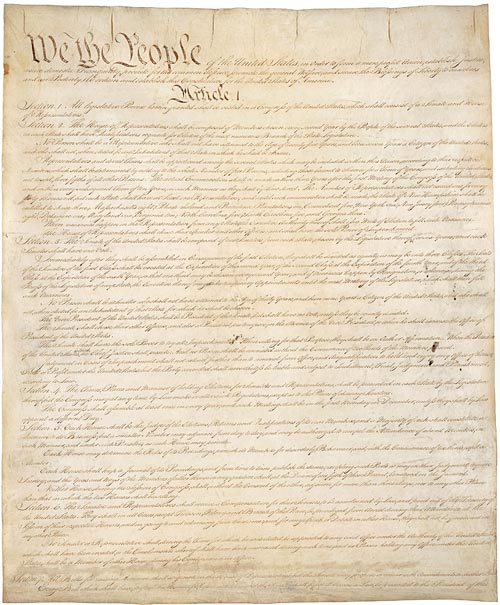
New Hampshire became the ninth state to ratify the U.S. Constitution, thus putting the Constitution into effect as called for by Article VII.
1788

Portsmouth-born John Langdon was elected New Hampshire's first United States senator. Langdon, a delegate to the Constitutional Convention and a signer, was serving as president (governor) of the state at the time of his election.
1789

Paine Wingate, born in Amesbury, Massachusetts, but later of Stratham, New Hampshire, was elected New Hampshire's second U.S. senator.
1789
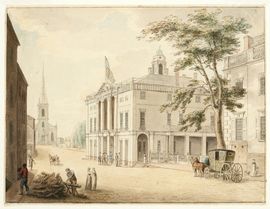
The Senate convened for the first time at Federal Hall in New York City. New Hampshire senators John Langdon and Paine Wingate both took their seats, but because only eight senators were present, there were not enough to constitute a quorum. The body was forced to adjourn each day until April 6, when it achieved its first quorum of 12 members, out of the eligible 22.
1789
The Senate drew lots to determine the three classes of senators. Senator John Langdon was assigned the Class 3 seat (with a six-year term to expire in 1795) while Senator Paine Wingate was assigned the Class 2 seat (with a four-year term to expire in 1793).
1789
Vice President John Adams administered the oath to support the Constitution to all senators present, including John Langdon and Paine Wingate. The statute regulating the taking of an oath, mandated by Article VI of the Constitution, was enacted on June 1, 1789.
1796

The Senate elected Samuel Livermore as its president pro tempore. Born in Waltham, Massachusetts, but later of Holderness, New Hampshire, Livermore was elected president pro tem for a second time on December 2, 1799.
1814
Former senator Charles Cutts (1810-1813) of Portsmouth was elected secretary of the Senate and served in that capacity until December 12, 1825.
1827

Senator Levi Woodbury of Portsmouth became chairman of the Committee on Commerce (today's Committee on Commerce, Science, and Transportation), serving until 1831. In 1841 Woodbury served in the Senate again as the state's Class 2 senator (1841-1847).
1833
New Hampshire-born John Shackford was elected Senate sergeant at arms, serving until his death in 1837.
1836

Senator John Page of Haverhill was elected chairman of the Committee on Agriculture (today's Committee on Agriculture, Nutrition, and Forestry), serving until 1837.
1847

John Parker Hale of Dover began his Senate service as the first United States senator elected on an antislavery ticket.
1847

New Hampshire's Class 3 senator, Charles Gordon Atherton of Nashua, became chairman of the Committee on Finance and served until 1849. In March 1853 Atherton began a term as the state's Class 2 senator but died in November.
1852

Former senator Franklin Pierce was elected the 14th president of the United States. Pierce, who was born in Hillsborough and later lived in Concord, served in the Senate from 1837 to 1842.
1853
Jared Warner Williams of Lancaster, New Hampshire, was appointed to fill the vacancy caused by the death of Senator Charles G. Atherton on November 15. Williams took his Senate seat on December 12, but in July 1854, questions were raised as to whether his appointment had expired when the state legislature met in June of that year, or only when it elected a successor. After a committee investigation, the Senate adopted a resolution in August 1854 declaring that "the right of representation under the appointment" had expired. The vacant seat was filled on July 30, 1855, with the election of former senator John P. Hale.
1864

The Senate elected Senator Daniel Clark of Manchester as its president pro tempore. Clark was elected president pro tem again on February 9, 1865.
1867

A professor of mathematics, astronomy, and meteorology at Dartmouth College, James Willis Patterson of Hanover began his Senate service. Patterson became one of eight senators implicated in the 1873 Crédit Mobilier scandal and although a Senate committee report recommended his expulsion, no final action was taken because his elected term expired.
1869
The Senate elected John Robert French as its sergeant at arms, a position he held for the next 10 years. French, originally of Gilmanton, New Hampshire, had recently served as a United States representative from Edenton, North Carolina.
1881

Senator Henry William Blair of Plymouth and later Manchester became chairman of the Committee on Education and Labor (today's Committee on Health, Education, Labor and Pensions), serving until 1891.
1885
Henry W. Blair was appointed to fill the Senate term that began March 4, a vacancy caused by the state legislature not being in session to elect a replacement for the seat previously held by Blair himself, who had not been a candidate for renomination. On June 17, Blair was elected to the full term. After his Senate service, Blair returned to the House of Representatives for one term.
1886
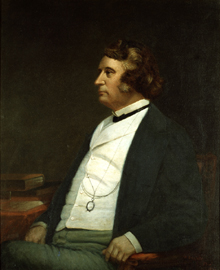
A portrait of Massachusetts senator Charles Sumner by Walter Ingalls, of Canterbury, New Hampshire, was purchased by the Joint Committee on the Library.
1890
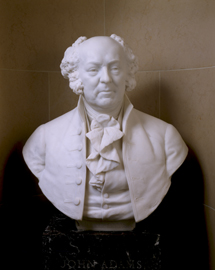
A marble bust of the nation's first vice president, John Adams, was placed above the rostrum in the Senate Chamber. Sculpted by New Hampshire-born artist Daniel Chester French, the work was one of the original five commissioned for the Senate Vice Presidential Bust Collection.
1891

Jacob Harold Gallinger began his 27 and 1/2 years of service in the Senate, a record for a senator from New Hampshire. Born in Cornwall, Ontario, Gallinger practiced medicine in Concord before entering politics.
1894
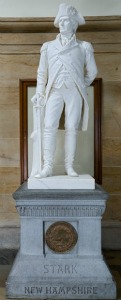
The Senate moved to accept a marble statue of Revolutionary War Major General John Stark, born in Londonderry but later of Concord, and a marble statue of Salisbury, New Hampshire, native Daniel Webster for placement in Congress's National Statuary Hall Collection.
1911
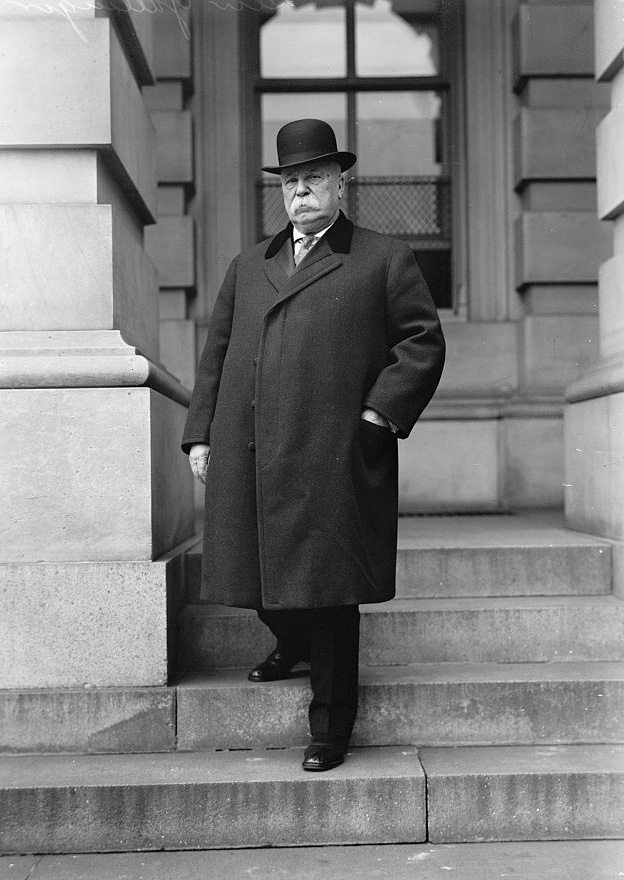
Senator Jacob H. Gallinger was appointed chairman of the Republican Conference's Committee on Committees, serving until 1913. On March 5, 1913, Gallinger was elected Republican Conference chairman, serving until 1918.
1911

Senator Henry Eben Burnham of Manchester became chairman of the Committee on Agriculture and Forestry (today's Committee on Agriculture, Nutrition, and Forestry), serving until 1913.
1911
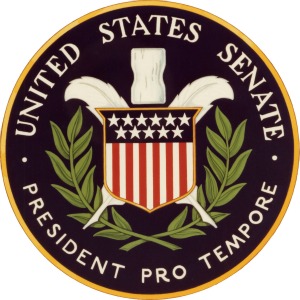
Deadlocked over the election of a new president pro tempore, the Senate agreed to a system in which Republican Jacob H. Gallinger would alternate presiding in the post with Democrat Augustus Bacon of Georgia and three other Republican senators.
1914
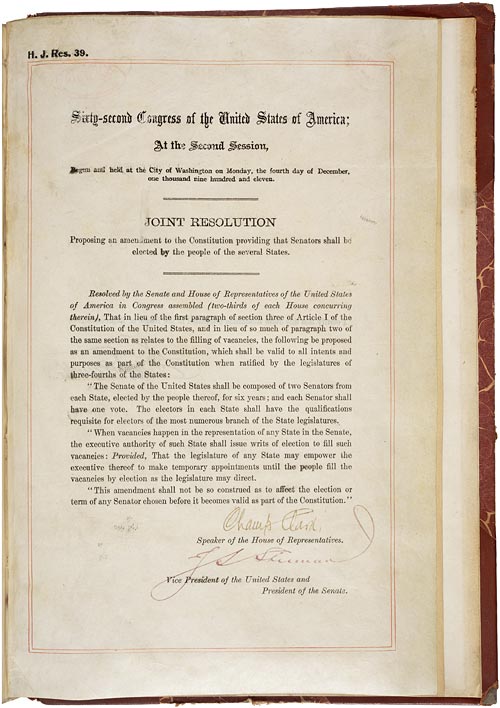
Jacob H. Gallinger, a member since 1891, became New Hampshire's first directly elected senator under the terms of the Seventeenth Amendment.
1916
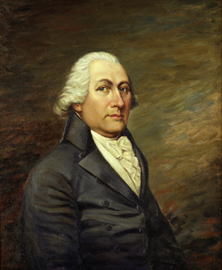
The Senate authorized the Joint Committee on the Library to purchase a portrait of New Hampshire senator John Langdon by Hattie E. Burdette.
1925

The Senate elected George Higgins Moses as its president pro tempore. Born in Lubec, Maine, but later of Concord, Moses was elected president pro tem again on December 15, 1927.
1929

Senator George H. Moses became chairman of the Committee on Rules (today's Committee on Rules and Administration), serving until 1933.
1929
Senator George H. Moses was appointed chairman of the Republican Senatorial Campaign Committee (now the National Republican Senatorial Committee), a position he held until 1931.
1937
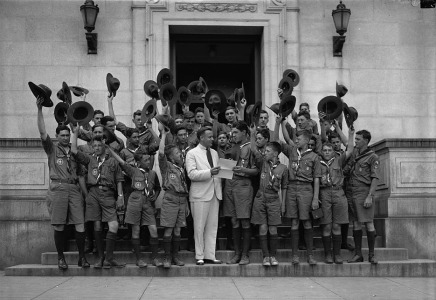
Born in West Pembroke, Maine, but later of East Concord and Concord, Henry Styles Bridges began the first of his five Senate terms and served a total of 24 years and 11 months before his death in 1961. During his tenure in the Democratic-controlled Senate, Bridges opposed President Roosevelt's attempts to reorganize the Supreme Court and used his position as ranking Republican to block New Deal measures.
1947
Beginning in 1947, Styles Bridges, a Republican Party stalwart, served in a variety of leadership positions during his 24 years in the Senate: chairman of the Republican Conference Committee on Personnel (1947?1953); chairman of the National Republican Senatorial Committee (1951?1953); Senate minority leader (1952?1953); and chairman of the Republican Policy Committee (1955?1963).
1947

Senator Styles Bridges became chairman of the Committee on Appropriations, serving until 1949. Styles served once again as chairman of the committee from 1953 to 1955.
1947

Born in Roxbury, Massachusetts, but later of Temple, New Hampshire, Senator Charles William Tobey became chairman of the Committee on Banking and Currency (today's Committee on Banking, Housing, and Urban Affairs), serving until 1949.
1953
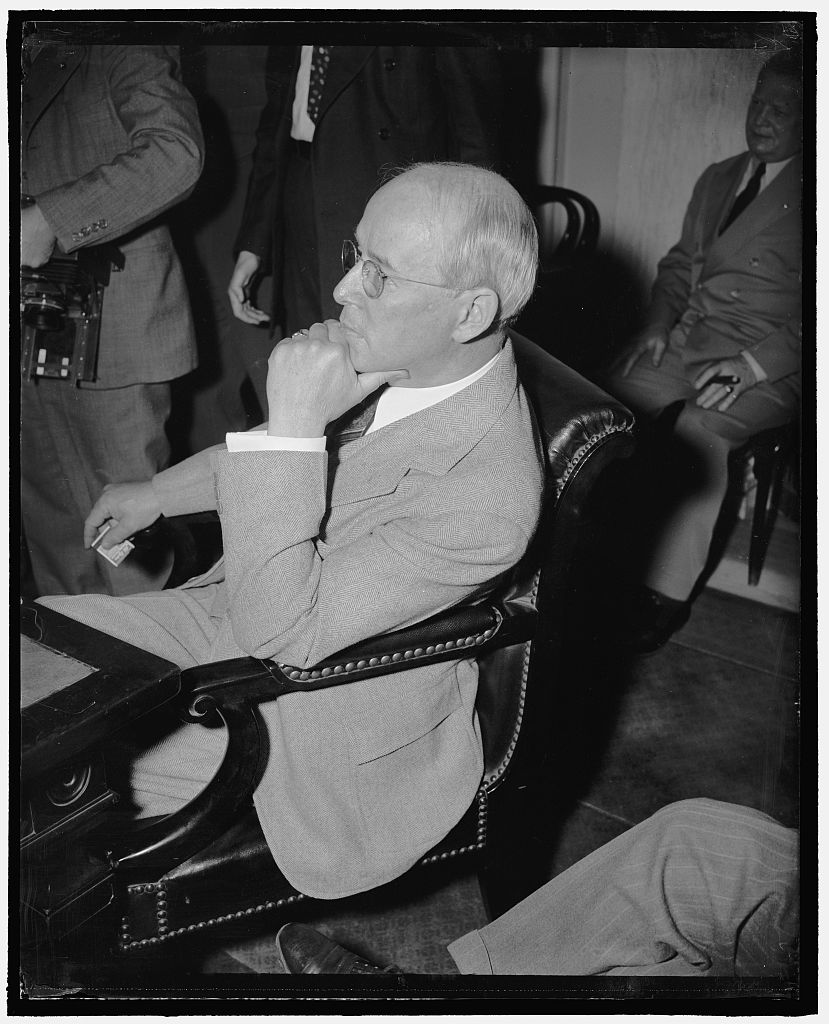
Senator Charles W. Tobey became chairman of the Committee on Interstate and Foreign Commerce (today's Committee on Commerce, Science, and Transportation) and served until his death in July of that year.
1954

Norris H. Cotton of Lebanon took his seat in the Senate, filling the vacancy caused by the death of Senator Charles W. Tobey on July 24, 1953. Reelected to three full Senate terms, Cotton once worked for former New Hampshire senator George H. Moses and served a second, brief interim Senate appointment in 1975.
1963
Beginning in 1963, Senator Norris H. Cotton served in a variety of party leadership positions during his Senate tenure: chairman of the Republican Conference Committee on Personnel (1963?1967), Republican Conference secretary (1971?1972), and Republican Conference chairman (1973?1974).
1967
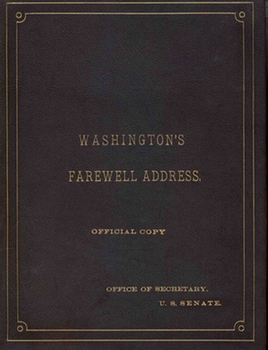
Senator Norris H. Cotton delivered George Washington's Farewell Address on the floor of the Senate, a tradition dating to 1862.
1974
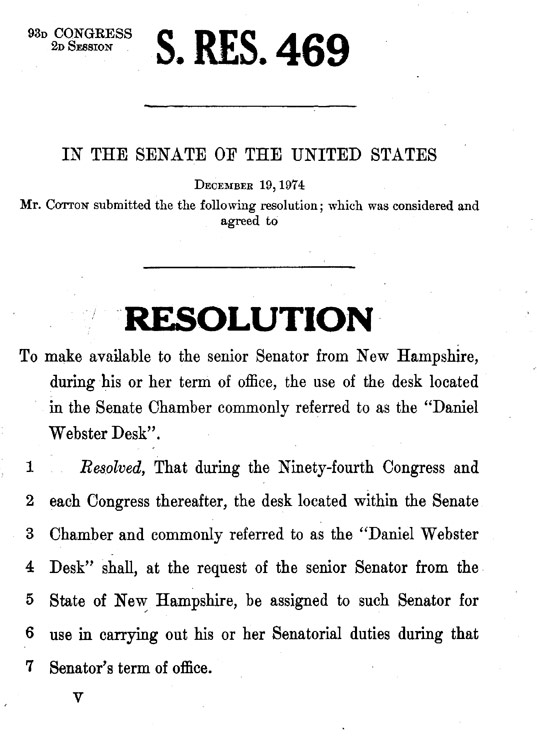
The Senate passed a resolution introduced by Norris H. Cotton providing that the Daniel Webster Desk be assigned to the senior senator from New Hampshire during that senator's term of office.
1975

John Anthony Durkin of Manchester, New Hampshire, began his Senate service after a prolonged and drawn out contested election battle against Republican Louis Crosby Wyman. After two recounts that failed to determine a winner, the full Senate voted to declare the seat vacant on July 30, 1975. New Hampshire scheduled a special election for September 16, 1975, which Durkin won by over 27,000 votes.
1981
The Senate passed a resolution formally naming room S-113 in the Capitol the Styles Bridges Room.
1996
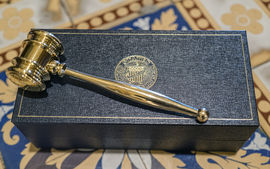
Senator Robert C. Smith, born in Trenton, New Jersey but later of Tuftonboro, New Hampshire, received a Golden Gavel Award for presiding over the Senate for 100 hours in a single session.
1997

Senator Robert C. Smith became chairman of the Select Committee on Ethics, serving until 1999. In November 1999, following the death of Rhode Island senator John H. Chafee, Smith became chairman of the Committee on Environment and Public Works, serving until 2001.
1999
Republican senator Robert C. Smith announced that he would change his party affiliation to Independent. The following November, however, Smith announced that he was changing back to the Republican Party. Smith noted that because his home town in New Hampshire had not yet changed his voter registration, he had technically never left the Republican Party.
2003

Senator Judd Gregg of Greenfield and Rye became chairman of the Committee on Health, Education, Labor, and Pensions, serving until 2005. That year Gregg became chairman of the Committee on the Budget, serving until 2007.
2003

Senator John Sununu, born in Boston but later of Bedford, New Hampshire, received his first Golden Gavel Award for presiding over the Senate for 100 hours in a single session. Sununu received a second gavel in 2006.
2009

Former New Hampshire governor Jeanne Shaheen of Madbury became New Hampshire's first woman senator, and the first woman to be elected as both a governor and a United States senator.
2012

Jeanne Shaheen delivered George Washington's Farewell Address on the floor of the Senate, a tradition dating to 1862.
2013

Kelly Ayotte of Nashua delivered George Washington's Farewell Address on the floor of the Senate, a tradition dating to 1862.
2023
Senator Jeanne Shaheen became chairwoman of the Senate Committee on Small Business and Entrepreneurship, a position she held until January 7, 2025.